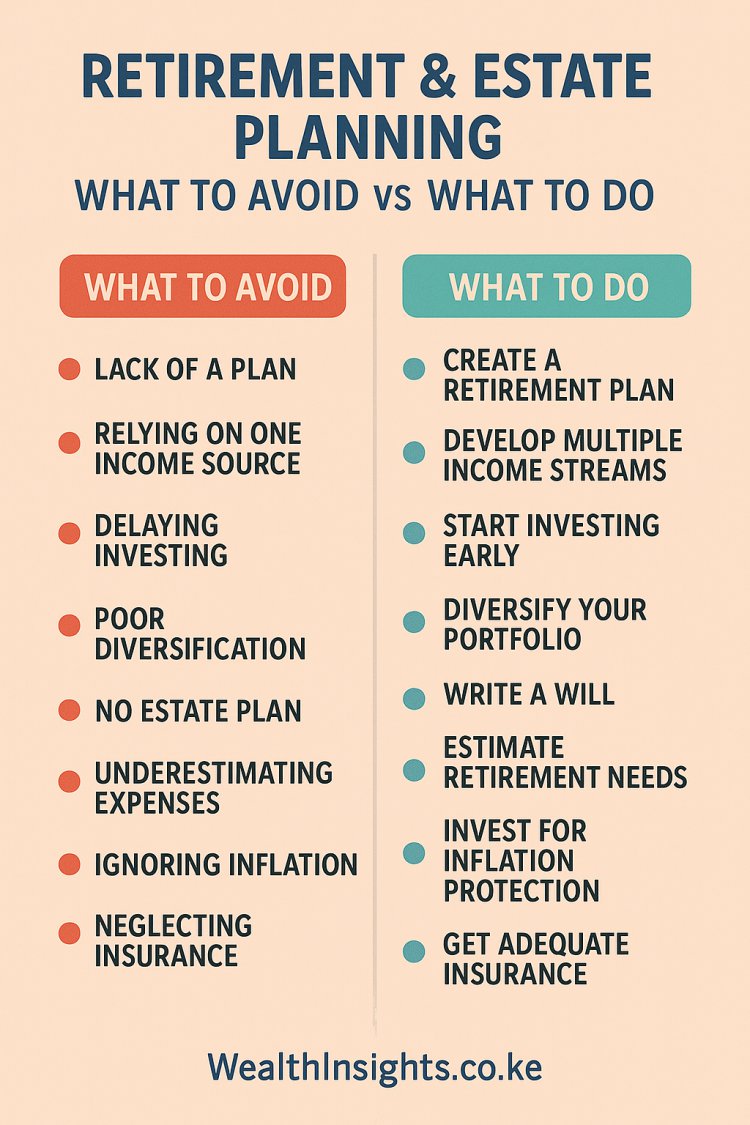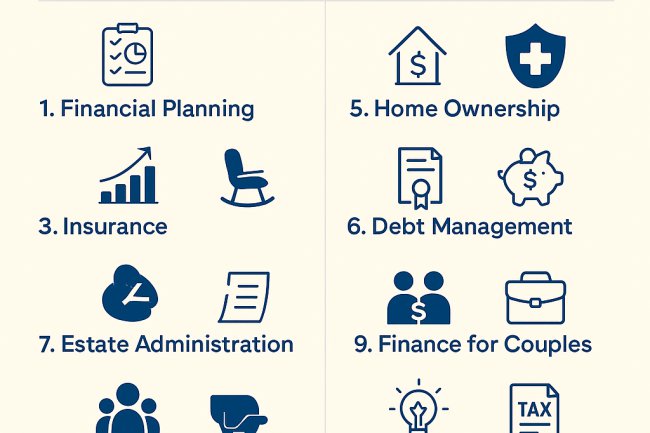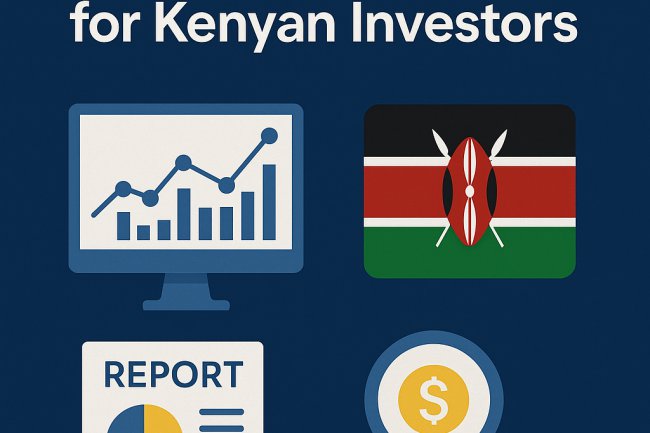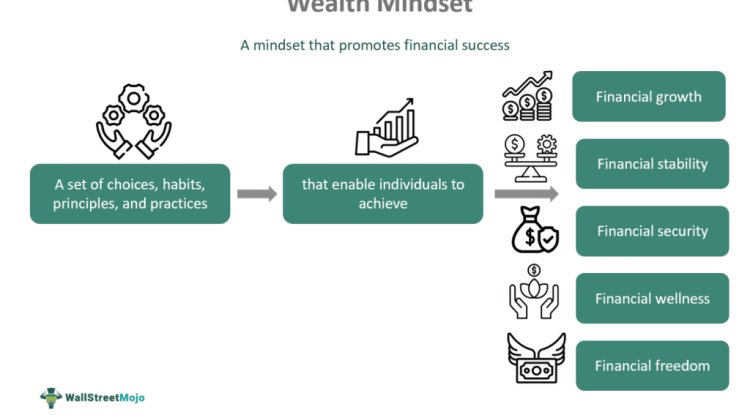What to Avoid and What to Do When Planning for Retirement and Estate Planning
Retirement and estate planning are not just for the wealthy — they’re for anyone who values financial peace, security, and legacy. This guide breaks down what to avoid and what to do when preparing for retirement: from diversifying income and protecting assets to writing a will and securing insurance. Learn how to build a lasting legacy while achieving financial freedom.

1. Avoid Living Without a Retirement Strategy
Too many people work for decades without a written plan. They “hope” that their pension or savings will be enough. Hope isn’t a strategy.
Without a roadmap, you’ll likely under-save, over-spend, and retire into anxiety.
✅ Do This Instead:
Create a Retirement Blueprint — an actual written plan outlining:
-
Your retirement age and expected lifespan (plan to 85–90).
-
Your estimated expenses in retirement.
-
Expected sources of income (pension, rentals, dividends, business, savings).
-
Investment mix for growth and safety.
Pro Tip:
If you don’t track it, you won’t improve it. Update your plan every 12 months.
2. Avoid Depending on One Income Source
Relying only on a salary or pension is dangerous. If inflation rises or your job ends early, your entire future collapses.
✅ Do This Instead:
Develop three pillars of income:
-
Active income – salary, business profits.
-
Investment income – dividends, interest, rentals.
-
Passive income – royalties, online content, or systems that pay you even when you rest.
Retirement isn’t about stopping work; it’s about replacing effort with systems.
3. Avoid Starting Late
Many postpone investing, thinking they’ll “start later when I earn more.” But time is the single most powerful force in finance. You can’t buy back years lost to procrastination.
✅ Do This Instead:
Start small and early. Even a modest contribution compounded over 25–30 years beats large sums invested late.
Example:
-
Investing $100/month from age 25 at 10% return → over $200,000 by 60.
-
Starting at 40 → less than $60,000.
The earlier you start, the less you need to invest to retire free.
4. Avoid Poor Asset Diversification
Putting all your savings in one type of investment — land, stocks, or one business — exposes you to unnecessary risk.
✅ Do This Instead:
Diversify your portfolio using the Core–Satellite Approach:
-
Core: 70–80% in stable, long-term assets (SACCOs, pension funds, government bonds, index funds).
-
Satellite: 20–30% in growth or high-return ventures (business, REITs, digital investments, global ETFs).
Diversification smooths returns and protects your wealth from market shocks.
5. Avoid Confusing Assets and Liabilities
A luxury car bought on credit is not an asset. It drains income. Many people go broke maintaining the image of success.
✅ Do This Instead:
Buy productive assets that create income or appreciate in value — rentals, stocks, intellectual property, or businesses.
When your assets buy your lifestyle, you’ve achieved freedom.
6. Avoid Ignoring Inflation and Currency Risk
If your savings grow slower than inflation, you’re losing purchasing power every year. A million today won’t buy what it does in 20 years.
✅ Do This Instead:
Invest in inflation-beating assets: equities, real estate, and indexed mutual funds.
Diversify across currencies (USD, GBP, or Euro) using international investment apps like Bamboo, Hisa, or Global ETFs.
7. Avoid Overestimating Your Pension
Employer pensions or government schemes rarely match your actual needs. Many retirees discover their payouts barely cover 40–60% of their lifestyle expenses.
✅ Do This Instead:
Treat your pension as one leg of a larger stool. Build your own Private Retirement Account (PRA) or Personal Pension Scheme, and top it up consistently.
Aim to invest 15–20% of your gross income toward retirement from your 20s onward.
8. Avoid Lifestyle Inflation in Midlife
The 30s and 40s are danger zones — higher incomes often trigger bigger expenses: new cars, bigger houses, private schools. That’s how retirement savings die quietly.
✅ Do This Instead:
Live slightly below your means and invest the surplus.
Each pay raise should fund an asset, not an expense. Let your investments grow while you maintain the same lifestyle for at least two years.
9. Avoid Ignoring Estate Planning
Avoid the “African curse” of leaving chaos behind. Dying without a will or estate plan causes legal battles, frozen accounts, and unnecessary pain for your family.
✅ Do This Instead:
Draft a valid will and update it every few years. It should specify:
-
How assets will be distributed.
-
Guardians for minor children.
-
Trustees for business or real estate.
Also, assign beneficiaries on insurance policies, SACCO accounts, and pensions — and keep records safe.
Consider setting up a trust if your estate is large or complex.
10. Avoid Ignoring Taxes
Without tax planning, your retirement income could face unnecessary deductions.
Many people forget that rental or investment income is taxable — eroding their net returns.
✅ Do This Instead:
-
Learn your country’s retirement tax exemptions.
-
Use tax-efficient investment vehicles.
-
Work with a licensed tax consultant or financial planner annually.
Strategic tax planning can extend your retirement income by years.
11. Avoid Overexposure to Real Estate
Land and property feel safe, but they’re often illiquid. In retirement, you need cash flow, not only bricks.
✅ Do This Instead:
Balance physical real estate with liquid assets — dividend stocks, SACCO shares, or money market funds.
Liquidity equals flexibility. You can’t sell one bedroom when you need cash.
12. Avoid Failing to Insure and Protect Your Wealth
Without insurance, a medical emergency or accident can wipe out decades of savings.
✅ Do This Instead:
-
Health insurance: covers medical costs.
-
Life insurance: protects dependents.
-
Property insurance: shields assets from loss.
-
Income protection: safeguards your lifestyle if you can’t work.
Insurance isn’t an expense; it’s a defensive investment.
13. Avoid Keeping Finances Secret from Family
It’s common, especially in Africa, for one spouse or partner to handle all financial matters. But secrecy leads to disaster when the key person passes away.
✅ Do This Instead:
Discuss money openly.
-
Share essential account details and estate documents with a trusted family member.
-
Involve your spouse or adult children in basic financial literacy.
Wealth without communication dies with the holder.
14. Avoid Neglecting Health and Relationships
Many prepare financially but neglect the two true wealth multipliers: health and community. Poor health and isolation erode both joy and savings in retirement.
✅ Do This Instead:
Invest in preventive health — nutrition, exercise, regular checkups.
Nurture family, social, and community ties. Financial freedom is meaningless without quality of life.
15. Avoid Leaving Everything to Chance
Retirement and estate planning require proactive action. Waiting for “the right time” or relying on default systems ensures mediocrity.
✅ Do This Instead:
Take control:
-
Write your will this year.
-
Open or review your pension plan.
-
Schedule annual financial reviews.
-
Mentor your children about money.
You’re not planning for death — you’re planning for peace.
Final Thought
Retirement is not the end of life; it’s the reward for how you managed your working years.
Estate planning is not for the rich — it’s for the wise.
When you combine disciplined investing with structured legacy planning, you build more than wealth — you build continuity, dignity, and freedom.
By Maertin K | WealthInsights.co.ke
Building Africa’s Financially Free Generation
What's Your Reaction?



















